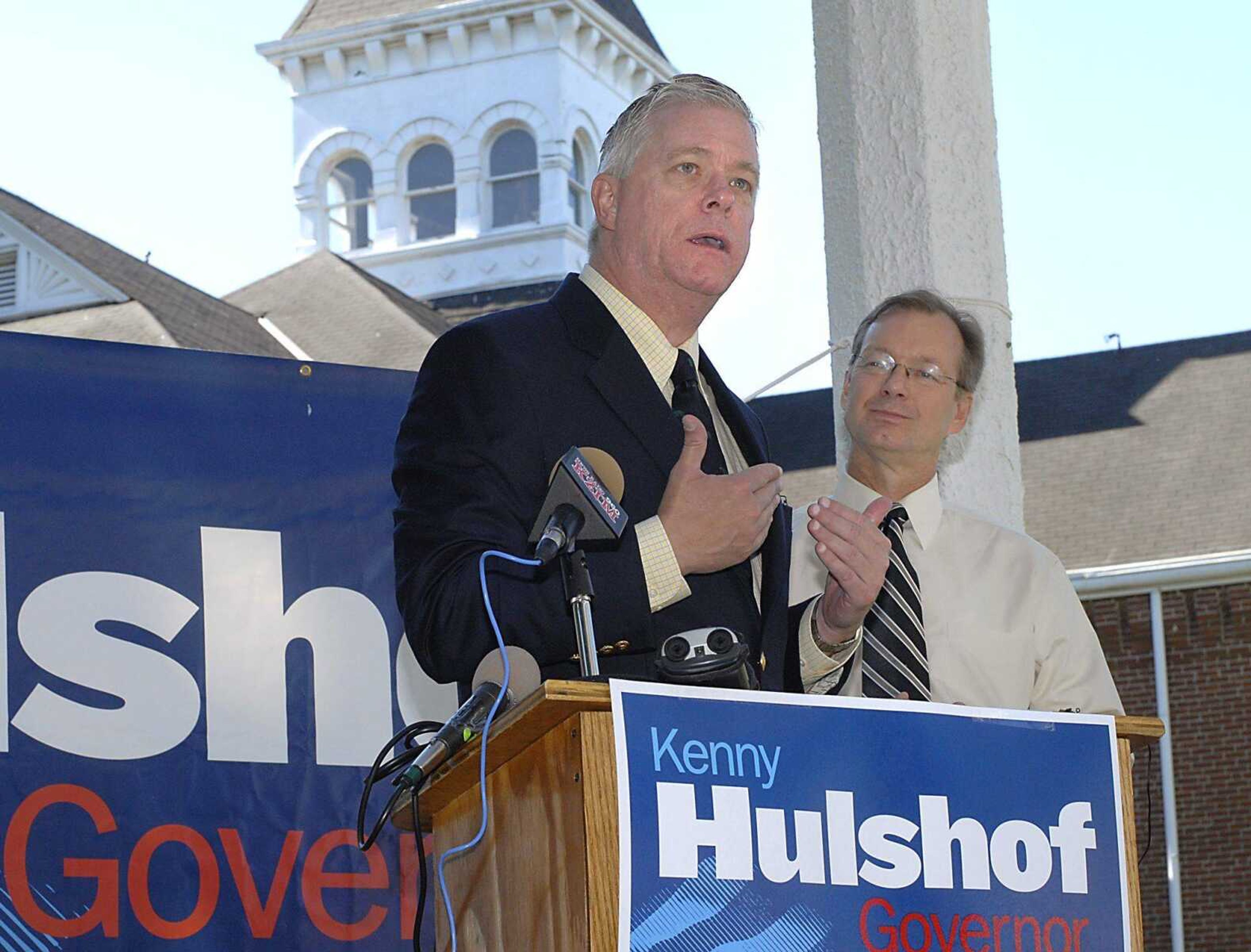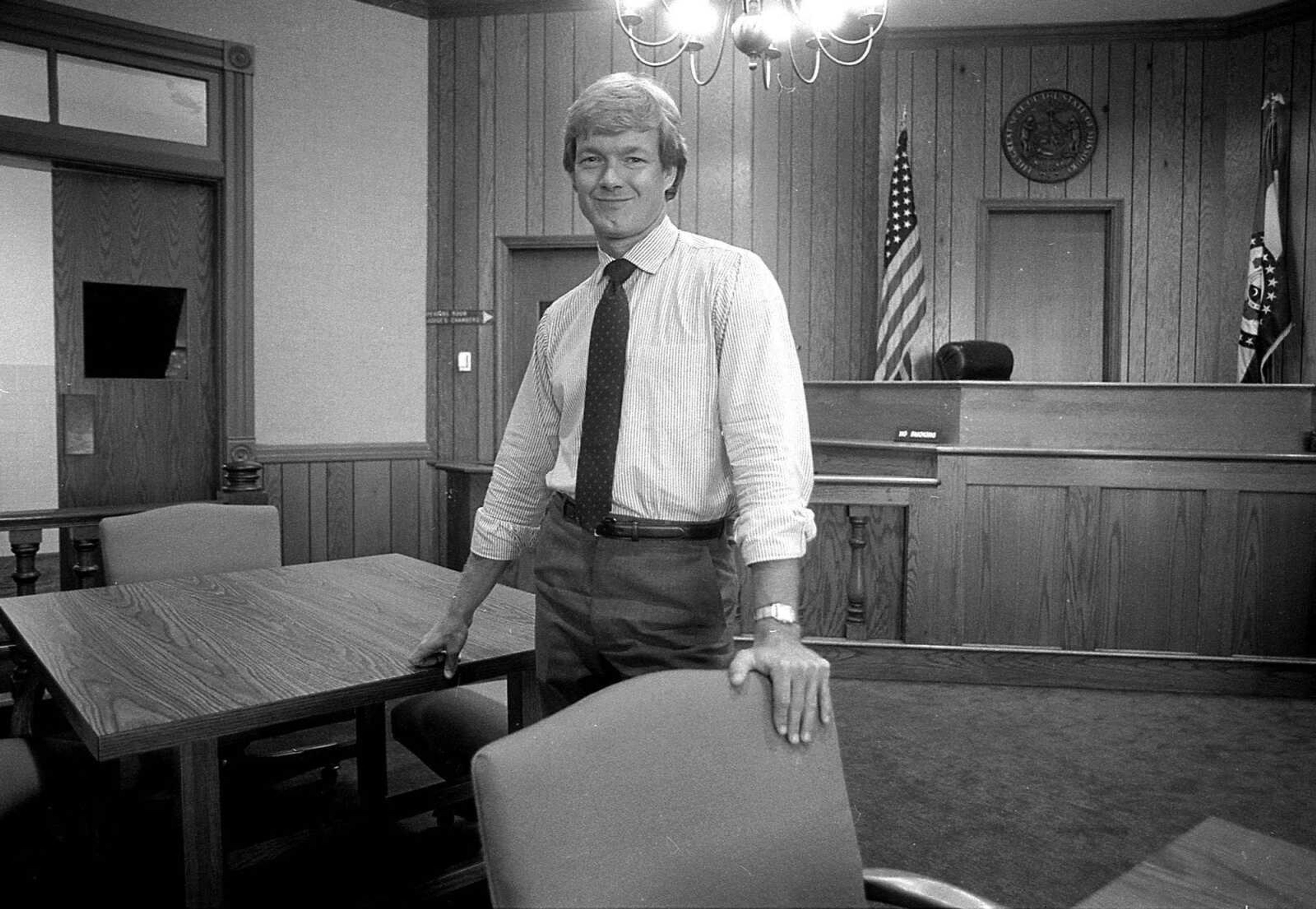Kenny Hulshof: The 'accidental' candidate for governor of Missouri
Editor's note: This is the first of two installments about Missouri's race for governor. A profile on Jay Nixon will appear next Sunday. By Rudi Keller Southeast Missourian On Jan. 1, Kenny Hulshof was a happy incumbent congressman. A father of two young girls, he and wife Renee Hulshof were settled comfortably in their Columbia, Mo., home. He held a politically secure position, representing the 9th Congressional District in Missouri since 1997...
Editor's note: This is the first of two installments about Missouri's race for governor. A profile on Jay Nixon will appear next Sunday.
By Rudi Keller
Southeast Missourian
On Jan. 1, Kenny Hulshof was a happy incumbent congressman. A father of two young girls, he and wife Renee Hulshof were settled comfortably in their Columbia, Mo., home. He held a politically secure position, representing the 9th Congressional District in Missouri since 1997.
Three weeks later, the Republican political world in Missouri was in turmoil. Matt Blunt became the first governor eligible for a second consecutive term to decline the race. Hulshof weighed his options, watching first Lt. Gov. Peter Kinder announce himself as a candidate and then state Treasurer Sarah Steelman.
Hulshof plunged in, Kinder withdrew and the party establishment coalesced behind the golden-haired farmer's son from Mississippi County. With no advance planning and a limited network of personal loyalists, Hulshof survived the bruising primary against Steelman. He now faces Jay Nixon, the Democratic attorney general who was once his boss.
His candidacy, which Hulshof called "accidental" in a recent interview, comes with political challenges.
He is not responsible for Blunt's record in office, but as inheritor of much of Blunt's support and organization, he must defend it. And at the same time his own record in Congress, with more than 7,000 votes on the floor and in committee, is open to microscopic scrutiny and attack.
Hulshof has sought to establish himself as a con-servative alternative to Nixon who will bring a different perspective to Jefferson City, distancing himself somewhat from Blunt but offering, more than anything, a fresh start.
"The whole issue is that of change and so, first of all, I have not had any of those battles in Jeff City," Hulshof said in a recent interview. "I don't have any of the battle scars, you know. I don't have any axes to grind. I don't have scores to settle. And so my whole platform has been one of, I offer a fresh perspective to the partisanship that has become more and more prevalent in our state government.
"The thing about Matt's record is there are things I would have done differently. There are things, though, that I embrace. I mean the idea of tort reform and reining in abuse of lawsuits or meritless lawsuits, I support that. Worker's comp changes, I support that."
Hulshof's career
Kenny Hulshof said he never set out to be a politician.
The only child of a Southeast Missouri farm couple, Hulshof studied agricultural economics at the University of Missouri before turning to law studies at the University of Mississippi. He spent six years in Cape Girardeau, first as a public defender and then as an assistant prosecutor. Hulshof developed trial skills that caught the attention of the Missouri Attorney General's office, then under the direction of Republican Bill Webster.
"We never had any conversation about any deep political ambition," said Cape Girardeau County Prosecuting Attorney Morley Swingle, Hulshof's boss at the time. "His focus at that stage of his life was to be the best trial lawyer he could be. Then my henhouse got robbed in Kenny's fourth year in my office."

Offered a job in 1989 as a litigator of particularly difficult or sensitive criminal cases, Hulshof accepted. He put Ray and Faye Copeland on death row for robbing and killing transients at their Northwest Missouri farm; he handled the prosecution of St. Louis Circuit Attorney George Peach when the anti-porn crusader was discovered using office funds to purchase the services of prostitutes.
When Nixon, a Democrat, was elected attorney general in 1992 after Webster's corruption scandals helped turn the state away from Republicans, he kept Hulshof. But Hulshof had already made his first, albeit ill-fated, foray into politics. He sought to wrest an appointment as Boone County prosecutor away from Boone County native Kevin Crane by securing promises from erstwhile Crane supporters that they would switch if they could be sure their ballots were secret.
"I always tell Kenny I did him a favor by winning that," Crane, who is now a circuit judge, said in a recent interview. "He wouldn't have been a U.S. Congressman."
The loss is the first instance -- but not the last -- where Hulshof exerted himself to win a position that, had he succeeded, would likely have turned him away from being the Republican candidate for governor in 2008.

By losing the chance to be prosecutor, Hulshof remained in the attorney general's office and was tapped to be a candidate for Congress in 1994 when University of Missouri political science professor Rick Hardy was hospitalized. He lost that race, too. But he did well enough to give it another chance in 1996 when he defeated a 20-year incumbent named Harold Volkmer.
Hulshof was determined to run for governor as 2004 approached, but the death of his father in November 2002 prevented him from making the race.
By the spring of 2007, he was publicly pursuing the job of president of the University of Missouri. He was passed over. But if he had landed the post, Hulshof said it would have been impossible to run for governor.
"This has never been ... about my political ambitions, because, again, it would have been almost accidental to be the Boone County prosecutor. And it was accidental in a sense that Rick Hardy pulled out of the race. And now Matt Blunt not deciding to run for re-election," Hulshof said. "I respect others who have a very detailed, organized, this-is-my-future [plan] and how I get to this high pinnacle of the political world. Mine has been just the opposite. Mine hasn't been, because our family is not political. We're farmers. So this has been opportunities along the way, and some of them I have fallen on my face. You know that '94 race, we came close. Had we not come close, I probably would not have run in 1996."

Luck has also played a role in Hulshof's rise to prominence. In 1996, a clerical error in Secretary of State Bekki Cook's office meant Hulshof's primary opponent for Congress, eye surgeon Harry Eggleston, seemed to be the winner. The St. Louis Post-Dispatch printed a headline, "It'll be Millionaire Against Volkmer," giving Hulshof a Trumanesque moment.
The error, once corrected, added 1,000 votes to Hulshof's total and gave him a 173-vote victory.
And no Democrat with a strong base challenged Hulshof throughout his tenure, leaving him to win re-election by majorities that at times exceeded 2-to-1.
"It costs a lot of money to run those races," said former governor Roger Wilson, a Columbia Democrat who was lieutenant governor when Hulshof was elected and a name usually included on the short list of potentially successful challengers. "Incumbents have an advantage. And there has to be a strong desire to grab that job. We had some people with desire, but I don't think the Democratic Party itself was strong enough."
Political positions
In Congress, Hulshof has amassed a voting record that brings high scores from conservative groups such as National Right to Life, Gun Owners of America, U.S. Boder Control and the Eagle Forum. Each of those groups rate Hulshof at 92 percent or higher, with right to life and gun owners groups scoring him at 100 percent.
Liberal groups give him low grades, with NARAL, the National Education Association and the American Immigration Lawyers Association scoring him at zero while the AFL-CIO rated him at 21 percent for last year and the NAACP giving him a grade of 40.
He has been a reliable Republican vote on most measures. His biggest break with the GOP leadership came in 2005, when he was kicked off the House Ethics Committee after leading the investigating subcommittee that dug into then-Majority Leader Tom DeLay's activities.
In his official biography, Hulshof takes credit as a co-author of an expansion of Education Savings Accounts, the sponsor of bills to make the 2001 tax cuts permanent and as the author of the Ticket to Work and Work Incentives Act from 1999 that made it easier for the disabled to maintain both jobs and Medicaid benefits.
The Ticket to Work program was eliminated from the Missouri Medicaid plan in 2005 under legislation pushed by Blunt.
In the primary, Steelman portrayed Hulshof as a party insider, a go-along, get-along Congressman who couldn't say no to a colleague. She sent a campaign worker dressed as a lobster to Hulshof events to highlight his vote for an appropriation to the Maine Lobster Institute at the University of Maine.
And Nixon has used Hulshof's voting record on issues ranging from trade deals and energy policy as well as earmarks.
In defending his record, Hulshof said votes are being taken out of context. In his hometown of Columbia, he noted, "I am often criticized for being too conservative." Hulshof said he is proud of his conservative stands. He said his opponents have taken his votes out of context and "I've had to defend and justify that record for my constituents."
As the campaign has developed, Hulshof has brought forth proposals for tightening access to abortions, increasing aid for college students, adding math and science teachers, encouraging exploration of Missouri "heavy oil" fields in the western areas of the state and controlling property taxes on senior citizens.
As the campaign enters its final weeks, voters will be bombarded by ads financed by unlimited donations for the first time since the 1990s. Hulshof said he's ready for the final debates over whether he or Nixon has the right approach.
"We'll be competitive under any system," Hulshof said. "... Here's the thing. I am not going to be overly critical of the attorney general, but to me it is almost laughable to say, 'I want to be an agent of change,' when you have been in Jefferson City politics for 20-plus years."
rkeller@semissourian.com
335-6611, extension 126
Kenny Hulshof video
var inlinePlayerParameters = "f":"MOCAP","mk":"en-ap","containerId":"inlinePlayerContainer","type":"ByUUIDS","prop1":"1c6e47b8-917f-4f13-9855-75603994c649,1997086a-a1f0-4dcc-b100-d1851ce1793f,e2d6b394-b7bd-43b6-8640-956f62520769,ca1dea92-170f-4dca-a792-8b0903f5c1cd","skin":"0","headlineColor":"#AB0110","borderColor":"#BBDDEE","padding":"4","sort":"Default","sortdir":"Descending"</script><script type="text/javascript" src=""></script>
Connect with the Southeast Missourian Newsroom:
For corrections to this story or other insights for the editor, click here. To submit a letter to the editor, click here. To learn about the Southeast Missourian’s AI Policy, click here.









